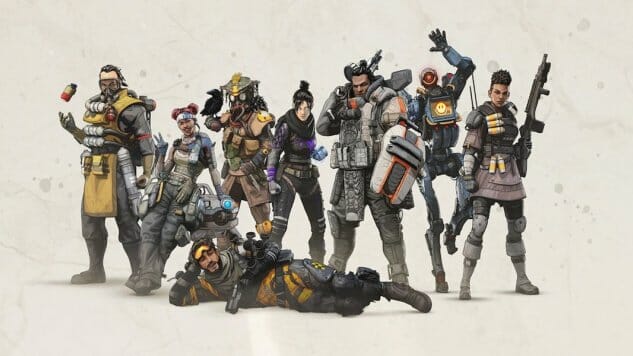
Apex Legends burst out of the gate with a ferocity that the battle royale genre hasn’t seen in a long time. This wasn’t the pioneering-but-clunky first attempts at the genre like PlayerUnknown’s Battlegrounds, nor was it the slow-but-unceasing dominance of Fortnite: Battle Royale, Apex is something different. Apex Legends feels like a game from ten years in the future, where our understandings of the battle royale genre have moved beyond the petty bugs and design foibles of today.
Instead, Apex Legends oozes polish. It’s fast, it’s relatively bug-free, it looks and sounds incredible, it has a game-changingly good contextual communication system, and perhaps most interestingly it’s managed to graft a character-focused roster onto a battle royale design more elegantly and effectively than its closest genre competitor in Call Of Duty’s Blackout mode or representation-discourse-regular Overwatch.
It’s not hard to see the comparisons between Apex Legends and Blizzard’s team shooter Overwatch, even if the differences in gameplay style are immediately obvious. Both games sport a roster of colorful and diverse characters, who reveal their backgrounds and personalities through quips, animations, and various combat differences. Both games have a focus on “fun” even though their characters are effectively told to enter deathmatches against each other regularly. Both games have a plucky and supportive robot teammate.
But where Overwatch has clumsily lurched toward revealing characters as queer, and has yet to include a single black woman character among an otherwise extremely racially diverse lineup (going so far as to show pieces of prerelease character art that depict known white characters in art styles that would suggest that they were black at some point during design), Apex Legends effortlessly launched their own roster with two characters confirmed as queer and only a single male character with lighter skin (jury’s out on whether or not Mirage is actually a white guy, and I’m comfortable with that for now).
These aren’t major, game-changing decisions. They’re, honestly, almost inconsequential to the overall arc of the game, either on a match-by-match basis or within the game’s larger narrative storytelling. Which makes the reluctance by Blizzard to reveal character’s sexual identities or to add characters of underrepresented racial backgrounds feel all the more antiquated and sluggish in comparison.
Where Blizzard has yet to include a single playable black woman in Overwatch’s current twenty-nine heroes, Apex launched the game with two—the soldier Bangalore and the combat medic Lifeline. Where Blizzard took six months to reveal that Tracer had a girlfriend, and three years to reveal that Soldier 76 was gay, Apex Legends’ starting roster includes Gibraltar (whose backstory confirms that he has a boyfriend) and Bloodhound, who uses they/them pronouns and has been confirmed as nonbinary by community manager Jay Frechette, as well as Bloodhound’s voice actor.
The fact of the matter is that these things shouldn’t be considered revolutionary. They aren’t, really, as I’ve mentioned. They’re the smallest steps that a game can make in order to consider itself a reasonable representation of an actual playerbase. It’s the type of thing that gets massive backlash if it’s even mentioned to a certain vocal (and toxic) portion of the “gaming community”, but that backlash isn’t indicative of a huge step forward—it’s indicative of an audience that is bigoted and uncomfortable with realistic representations of marginalized identities within games.
What Respawn has done with Apex Legends is not so much a giant leap forward in queer or nonwhite characters so much as it is a glaring sign of how far behind other games are. For a game as big globally as Overwatch, the fact that it hides character sexualities behind months of fan theories and speculation, only to dramatically reveal marginalized aspects of characters when it is determined most safe to do so, is cowardly and frustrating to deal with as a fan.
What Apex did was show how ridiculously simple it is to just do things better from the start instead of waiting until a game achieves sufficient popularity in the mainstream to “earn” a gay or black character. In a representational landscape where even the smallest steps feel like giant leaps, I’m more than happy to take what I can get, but Respawn’s nonchalant attitude toward diverse inclusion is a breath of fresh air in an otherwise frustratingly slow-to-change gaming space.
Apex Legends is a design powerhouse, one of the best battle royales in recent memory, and it’s already shaping up to become one of the world’s most popular games. I think it’s pretty neat that it also has some of the most refreshing characters I’ve seen in a AAA game in a long while.
Dante Douglas is a writer, poet and game developer. You can find him on Twitter at @videodante.